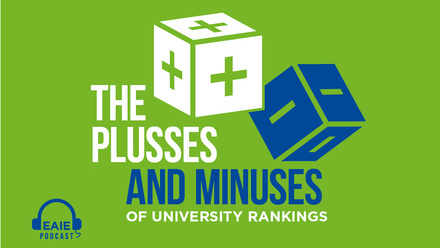In defense of rankings

Rankings are a polarising topic. Ellen Hazelkorn: The plusses and minuses of university rankings, while others cite their potential to encourage positive change. Where do you land in this ongoing debate?
Global university rankings come in for a lot of legitimate criticism: for their sometimes overbearing influence; for the way they can be misused by people who should know better; and, of course, for the way they reduce all the wonderful, complex, life-affirming things that universities do into a simple set of composite scores presented in a hierarchical list.
These concerns are entirely valid, and it is a responsibility of the rankers to maintain a transparent, constructive and responsive dialogue with the international higher education community.
But so many concerns raised about global rankings seem to be misguided. Sometimes, they are based on assumptions, such as claims the global rankings are a Western, Anglo-Saxon construct when the first global rankings originated in China, or the assumption that all reputation surveys are the same. Criticism may rely on an outdated understanding of the data and analytics landscape, or even in some cases stem from a naïve and dangerous belief that higher education and research should be one of the only vital areas of public life that are not subject to such external, independent scrutiny in the form of rankings.
So many concerns raised about global rankings seem to be misguided
So as we approach the 20th anniversary of global rankings (which first came on the scene in 2003, with the Shanghai Jiao Tong ranking, now known as the ARWU ranking) – and setting aside the huge role they have played in helping millions of students and their families to make informed choices – here’s my list of just four key areas where the rankings have made a real, positive contribution.
1. They support government policymaking
Taking the ranking exercise I lead as a prime example, it is often forgotten that the original idea for the creation of Times Higher Education’s World University Rankings was not as a consumer guide for students, but as a means to assess the effectiveness of research policy.
The UK’s Lambert Review of Business-University Collaboration, by former Financial Times editor Richard Lambert, explained in December 2003 that "a league table of the world’s best research-intensive universities would provide the Government with a way of assessing its research funding efforts," in a context in which "Government policy is to finance university research in such a way as to ensure that the UK has a number of institutions able to compete with the best in the world."
On this basis, the Times Higher Education World University Rankings, which were created less than a year after Lambert’s report, have been a resounding success. A decade after Lambert, the then-minister of UK universities David Willetts said that the UK government "broadly accept the criteria used by THE, which is why our policies are focussed on the same areas".
Shashi Tharoor, when he was Minister of State for Human Resources Development in India, said that the THE rankings "are the principal yardstick we should look to". Dirk Van Damme, at the time the Head of the Innovation and Measuring Progress Division (IMEP) at the OECD, said that the rankings "enable us to analyse the dynamics of higher education development and to comparatively relate excellence to policies".
2. They support university leaders’ institutional strategy
The Lambert report also said that a new global ranking "would help vice-chancellors in their efforts to win the support of their colleagues and the Government for their strategic plans" – and the data behind the rankings are now embedded into many university strategies.
Of course, there are legitimate concerns that some universities feel encouraged to pursue rankings success for its own sake, chasing metrics that may not have been part of their original mission or focus. But, rankings that offer a wide range of individual metrics can provide a positive framework to help institutions set their own range of performance indicators: for example, in ensuring that research is more widely disseminated and impactful, that more external funding is won from industry, that institutions forge more international research partnerships or widen their pool of staff and students from across international borders. The proliferation of rankings is also positive: there is no single perfect model of a great institution, so no single ‘correct’ ranking, and rankings are increasingly reflecting a wide diversity of university missions.
Rankings that offer a wide range of individual metrics can provide a positive framework to help institutions set their own range of performance indicators
My favourite story of how the world rankings have been used positively to support strategic planning was from Malegapuru Makgoba, founding president of South Africa’s University of Kwazulu Natal. The university was created from a post-apartheid merger of the University of Natal and the University of Durban-Westville, in 2004, the same year as the THE rankings were first published. Makgoba has explained how he used the global rankings to help galvanise and unify the newly formed university with a clear set of independent, and international performance indicators. "Independent assessments like these point the way forward," he has said.
3. They support emerging universities from the Global South
Stories like that of Makgoba at Kwazulu Natal inspire, because they counter simplistic criticisms that global rankings entrench the advantages of the global north.
While there is no question that universities in rich nations continue to dominate the upper echelons of the traditional global rankings, and that their relative wealth gives them an advantage, there is clear evidence of what I call a "great global levelling up".
While universities in rich nations continue to dominate the traditional global rankings, there is clear evidence of what I call a "great global levelling up"
In 2018, universities in countries classified as emerging economies by the London Stock Exchange’s FTSE Group represented 34% of all universities listed in the THE World University Rankings. In the 2022 edition, they represented 42%. And rising representation has been accompanied by rising rankings – among the world top 500 institutions, the average ranking position of emerging economy universities rose 111 places between 2018 and 2022.
Indeed, some experts have said that the global rankings have been more important to emerging economies than to the traditionally dominant nations. Halima Begum, now chief executive of the Runnymede Trust, a race equality think tank, said in 2014 (when she was director for education in East Asia at the British Council) that as policymakers in developing countries place far more store in universities as engines of economic growth, the rankings were vital as a "yardstick to measure progress". They "helped focus government attention on education policy, particularly in countries where there are inadequate quality assessment measures", she said.
4. They facilitate international collaboration
Universities in emerging economies have also reported how the rankings have helped them to gain visibility and open up partnership opportunities. Daniela Veliz, professor of education at the Pontifical Catholic University of Chile, told Times Higher Education in 2020 that enquiries and visits from foreign universities had dramatically increased as university leaders across Latin America embraced global rankings.
"Institutions that you would never have thought want to work with us really want to partner with us," she said. "I think rankings are relevant not to just Harvard… and Oxford; they have an impact on other types of institutions and countries."
The THE World University Rankings are unique in including international research collaboration as a performance indicator, and Veliz’s experiences are backed up by research. The Rankings in Institutional Strategies and Processes (RISP) report by the European University Association found that more than 50% of institutions said that rankings had helped their institutions establish academic partnerships and foster international collaborations.
A May 2018 article in The Economist on ‘How global university rankings are changing higher education’ found plenty to criticise about the world rankings, but conceded that they had "fostered the growth of a community that knows no borders… the world benefits from the growth of this productive, international body of scholars."
And that is a rankings legacy that I’m immensely proud of.






